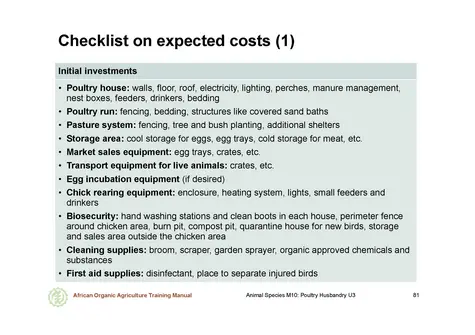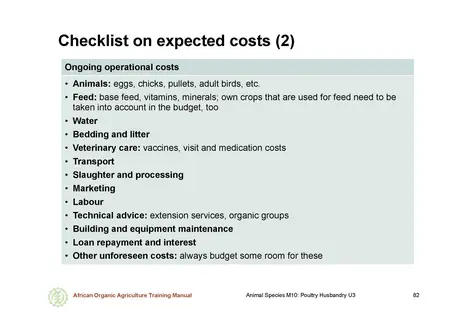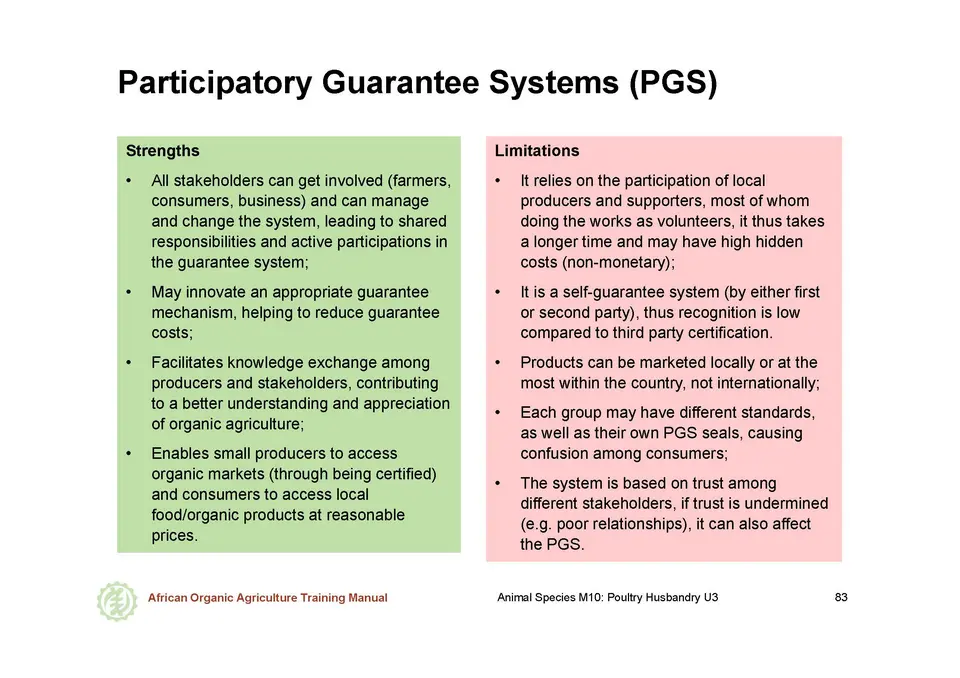Economics and organic certification
Starting a poultry business
Before starting an organic poultry business, it is important to know the market, the investment costs, running costs, and expected revenue for all products. So, farmers must calculate if the business is economically feasible before deciding to produce poultry organically, to decide which products to produce, and what to start with. Risk assessment by analysing potential events that may negatively impact poultry production should be part of the economic feasibility check.
Determining costs and revenues
The expected costs including initial investments and ongoing operational costs can be estimated based on the lists in the slides.
The expected revenues include animal products like eggs for consumption or fertilised eggs, meat, live birds, and by-products. Although own products harvested by producers from their own farms for feed and manure from the farm for fertilising the crops are not strictly revenues, they reduce the expenses and, in the case of manures, increase yields. Therefore, they should be considered in the budget.
Exercise on business planning and managing risks
Using the checklist as a general guide, ask the farmers to work in small groups to make a rough budget with expenses and expected revenues together.
Invite then the groups to present their estimations. For the discussion, use the following questions:
- What costs are unclear or unknown?
- Are there any additional costs not listed?
- What kind of marketing plan and costs have producers experienced?
- What are some of the risks and challenges in business planning that producers have experienced, and how did they overcome them?
Organic certification and marketing
Small-scale poultry production mostly aims at improving household nutrient consumption along with income. With growing awareness of animal welfare and sustainable agriculture in African societies, there is growing interest in organic certified eggs and chicken meat on national markets. However, on an international level, there may be demand for these products only in regional markets.
For marketing and labelling poultry and other agricultural products as organic, there must be a verifiable system to confirm that these products have been produced according to acceptable organic practices.
Organic certification
Certification is the process by which an organic inspection and certification body gives a written and reliably confirmed assurance that the products have been produced in accordance with specific organic standards. Certification is crucial to building confidence among producers, processors, distributors and consumers.
In Africa, most organic farms are certified as groups, not as individual farms. Group certification is done either through an Internal Control System (ICS) or a Participatory Guarantee System (PGS).
In Africa, animal products are commonly targeted for the local market in the producing countries whereby production is based on locally accepted standards, and commonly sold under participatory guarantee systems (PGS) as compared to the more expensive third party certification with ICS which normally applies to international exports.
Discussion on organic certification
Discuss in small groups the following questions:
- What questions do you have about organic certification?
- What are some of the costs and benefits of certification?
- What are local and national organisations that can advise you if you want to convert to organic poultry production?
Third party certification
In Europe, the legal basis of organic agriculture is the new Regulation (EU) 2018/848. However, organic imports into the EU are still certified under the previous Council Regulation (EC) 834/2007 until the end of 2024. Organic agriculture, both in the US and for imported products, is regulated in the National Organic Program Regulation (NOP). These regulations define the rules for organic production, processing and labelling of agricultural products as “organic” in these countries. For the export of organic products outside of Africa, farmers would have to comply with the legal standards of the country of import. In some cases, additional certification against private organic standards is necessary. The standards from private label organisations are stricter than national regulations. Whereas the EU regulation permits farms to operate both an organic and a non-organic production unit under special restrictions, most private organic label organisations require that the entire farm must be managed organically (for more information see the manual on organic certification at www.organic-africa.net).
Generally, for small farms, only conversion of the entire farm is recommended, as the farm unit would become too small to enable establishment of a diverse production system, allow proper crop rotation and introduction of livestock. Parallel production, i.e. the production of the same livestock species under organic and non-organic management, is not allowed even under the EU Regulation.
The certification process starts with signing a contract with an organic certification body operating in the country. The conversion begins once the farmer renounces the use of synthetic pesticides, fertilisers, GMO and chemically treated seeds, and starts to apply all organic crop and livestock production rules including the use of organic animal feed, good husbandry practices, etc.
For plant production and pastures, the conversion period to organic is 2 years before sowing for annual crops and 3 years before harvest for perennial crops. Land that has not been treated with forbidden substances for at least 3 years can be certified with a retroactive recognition of the conversion period. For organic animal production, feed production and pasture on the farm must be converted to organic, too. So, for most farms the conversion period of the land (crops and pasture) determines when the farm becomes organic. The specific length of the conversion period otherwise depends on the animal species and whether the animals are kept for egg, meat or milk production (6 weeks up to 12 months).
After the first 12 months of conversion, products can be marketed as ‘organic in conversion’. Once the conversion period is finished, the products can be certified and sold as organic. A stepwise reduction of agrochemical use is not considered part of the conversion period.
The national organic movement or organic certification bodies operating in the country can provide further guidance and support for organic certification. Farmers should first consult the national organic movement and then sign a certification contract with an accredited organic certification body operating within the country. Producers should work with a certification organisation that has the necessary accreditations for the required standard and target markets.
Organic certification commonly happens through inspection and certification of an individual farm by an accredited certification body. But farmers can also be certified as a group. Annual Internal inspection for each farm member in the group is then carried out by an Internal Control System (ICS) and the ICS’ work is cross-checked by the external certification body during the annual inspection of the group.
Having completed the formal conversion period and received organic certification does not mean that the development of the farm is finished. It usually takes several years to establish a well-balanced farm ecosystem and restore natural soil fertility in the fields in the sense of organic farming.
East African organic products standard
The East African organic products standard (EAOPS) has been written for organic production in East Africa and has been adapted to conditions in East Africa. The East African organic products standard can be used for self-assessment by producers, declarations of conformity in the marketplace, certification by certification bodies in the region, or other kinds of verification. If the standard is used for the purposes of third-party certification, inspection and certification should be carried out in accordance to international norms, such as ISO Guide 65 or the IFOAM Accreditation Criteria. If adherence to the standard is verified through other mechanisms, those mechanisms shall adhere to the principles of competency, integrity and transparency.
Products from the same type of animal and the same type of production which are both organic and non-organic (conventional or in-conversion) on the same farm shall not be sold as organic unless the production is done in a way that allows for the clear and continuous separation of the organic and non-organic productions. The conversion period for poultry (meat and eggs) in the EAOPS is 45 days.
Participatory guarantee systems
Alternatively to classical third-party certification system, where an independent body is responsible for certification, Participatory Guarantee Systems (PGS) can be managed by producer groups themselves. PGS enable small producers to access and secure markets through a participative and collective certification mechanism. According to IFOAM, PGS are locally focused quality assurance systems based on the active participation of farmers, consumers, rural advisors, and local authorities. They all join to make decisions, to visit farms, to support each other and to check that farmers are producing according to an Organic Standard. PGS are built on a foundation of trust, social networks and knowledge exchange. PGS are very suitable for local or regional marketing, but will not be accepted by key organic import markets like the EU or the US. For more information see at www.ifoam.bio > Standards & Certification > Participatory Guarantee Systems.
Marketing
Like all other organic products, organic certification for poultry is worthwhile only if the eggs and/or the meat can be marketed with an organic price premium over the regular price. The premium must at least cover the certification costs and the major costs caused by organic management.
Ideally, most or all the products from the certified farms are marketed with an organic premium. In the case of exporting a product, the farmers need to work together in a group to produce enough volume and to ensure the quality and quantity requirements of the target market.
One of the key motivations driving farmers to convert to organic farming is the ability to access niche markets for their produce or products. Even under subsistence farming, with adequate quantities of crop and animal production, farmers should consider exploring market opportunities to sell the excess production to improve their incomes to meet other household needs. Before deciding on the market to target, if not already provided by the agents promoting organic farming, it is important to understand the requirements of that market in terms of the following aspects:
- The type of customers and their product requirements,
- The key actors, especially existing and potential competitors,
- Information about delivery channels and cost of delivery,
- Information about price offers and any premiums,
- Storage and packaging requirements,
- The required quantities, timeliness and consistence in delivery,
- Quality requirements,
- Whether organic certification is required and for which standards,
- Any value addition required to the products.
For more information on marketing of organic products, for example...
- where to find relevant information about market opportunities, prices and quality requirements,
- how the organic market chain is organised,
- how to identify and take advantage of organic market opportunities,
- how to identify market expectations in terms of quality, standards and know-how to cope with these standards,
- how to assess the market potential of organic products,
- how to develop a marketing concept, define a marketing strategy and apply marketing techniques,
- how to promote organic market development beyond individual businesses,
- how to determine usefulness of organic certification, and how to get access to it.
see the training materials related to marketing at www.organic-africa.net, including a trainer’s module, a booklet and a video.



 tap and then scroll down to the Add to Home Screen command.
tap and then scroll down to the Add to Home Screen command.